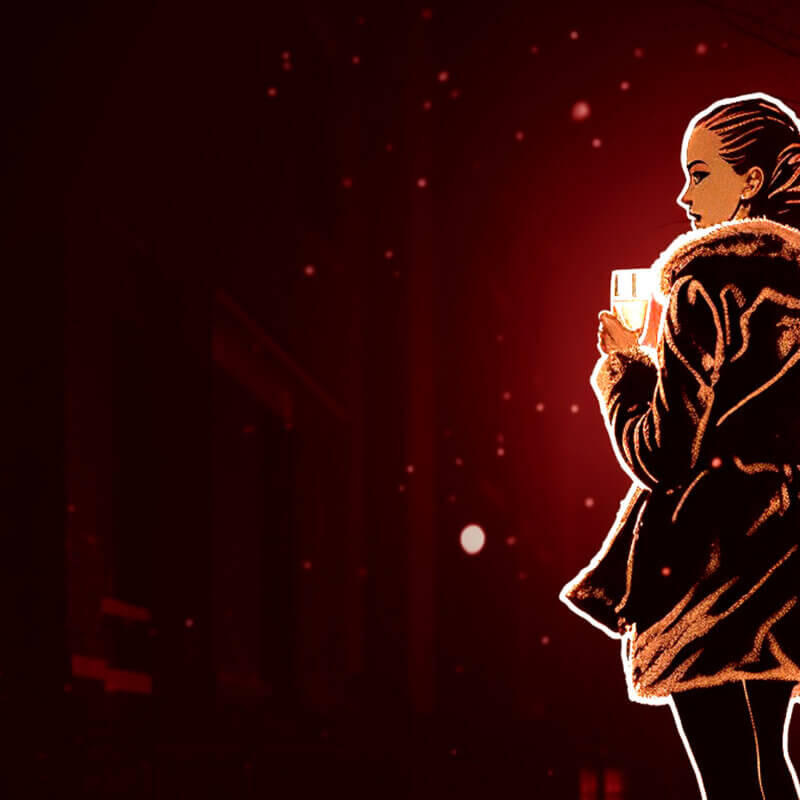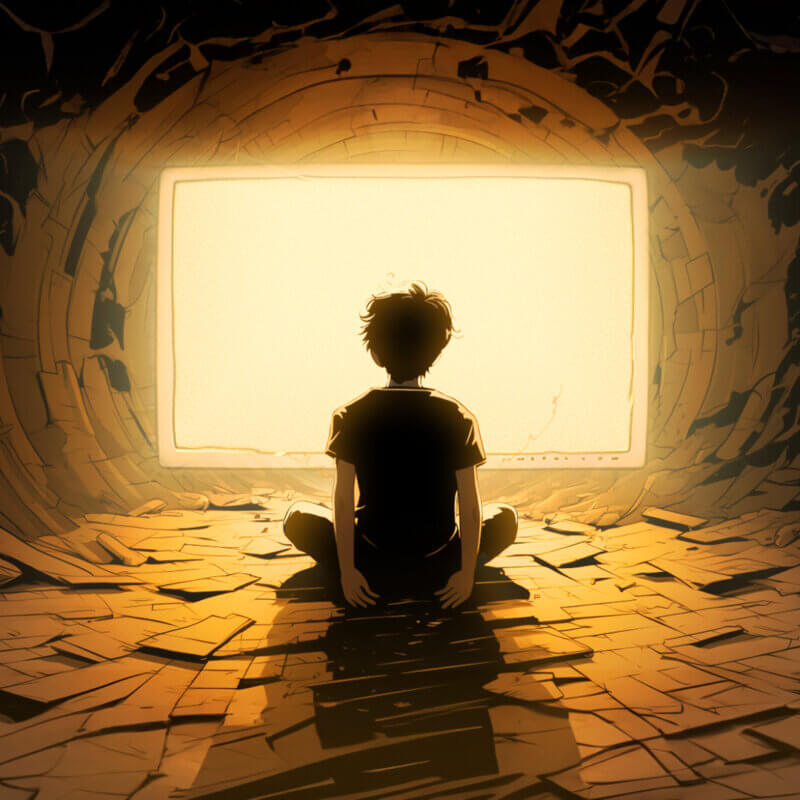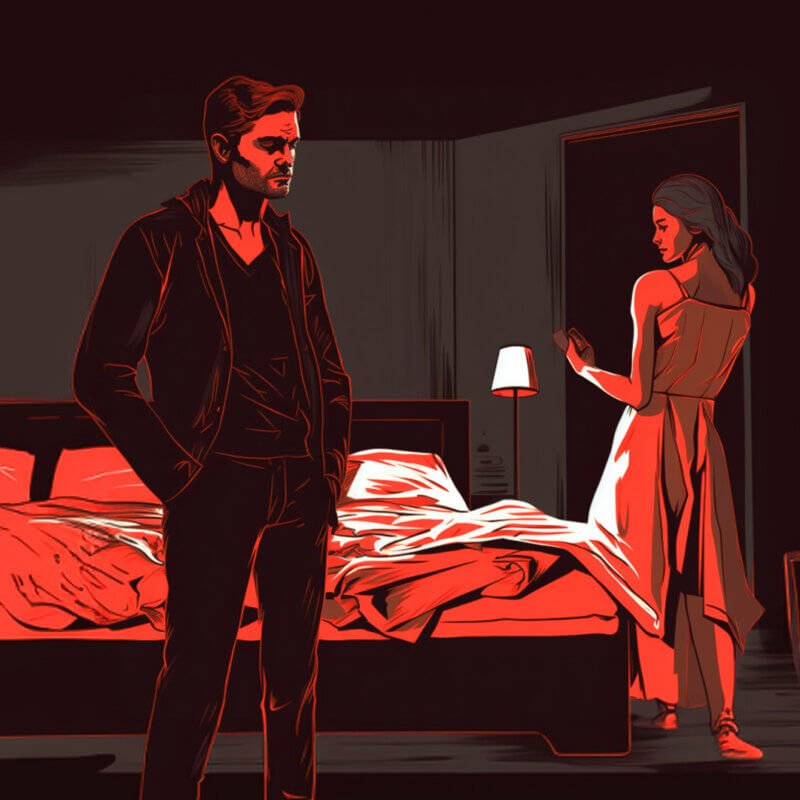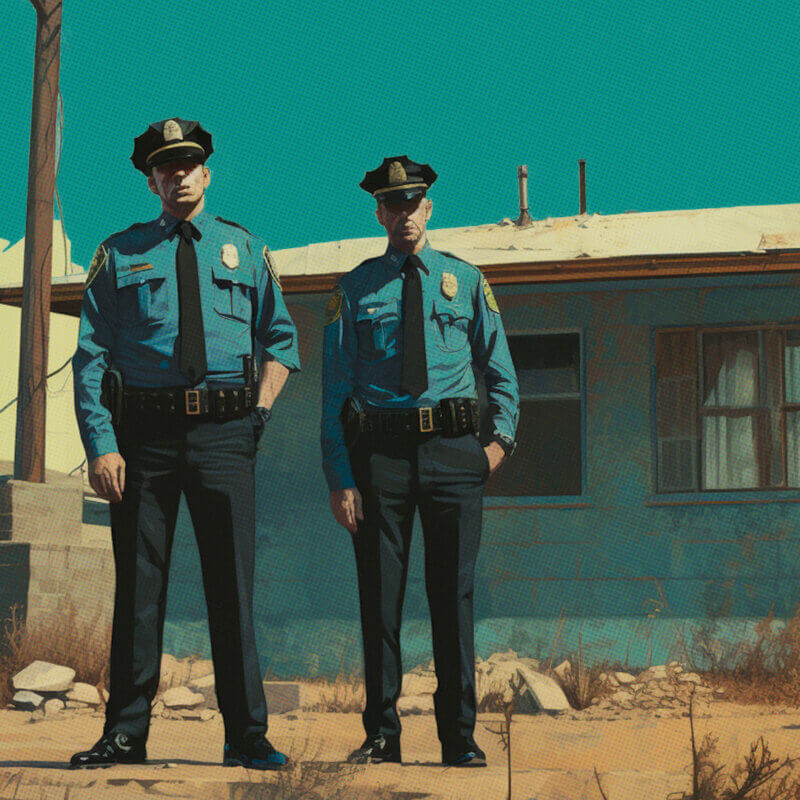Around the world, there is a growing movement of people seeking to remove all legal barriers to prostitution, often called sex work. They believe that by fully decriminalizing all aspects of the sex industry, prostitution will become safer and more empowering for women.
Out of this belief, a number of countries and organizations have adopted a pro-prostitution stance. But does full decriminalization or legalization actually make prostitution safer and more empowering?
In countries that have tried it, there is an exponential increase in the demand for prostitution. More men are enticed to buy sex. More men want to profit from a woman’s body. This leads to more pimps and brothel owners.
In turn, this increase in demand requires prostituted women to perform more extreme sex acts more frequently and get paid less. In this system, men become even more entitled and emboldened and women become even more objectified and exploited.
One male sex buyer explained, “She’s a prostitute, she’s not a person. She’s just a commodity. When I strip her of her humanity and she’s just an object, then I can do whatever I want to it and have no remorse.”
As a consequence of this mindset, instead of preventing the rapes, assaults, and trauma inherent to prostitution, full decriminalization or legalization actually perpetuates them.
One woman who survived this system of prostitution in New Zealand said, “I thought legal prostitution would give more power and rights to the women, but I soon realized the opposite was true.”
There is another even more insidious consequence of full decriminalization and legalization. While legalization fuels the demand for men who want to buy sex, there are never enough women willing to enter prostitution to meet that demand.
Because of this, in every country that embraces legalization or full decriminalization, there are higher rates of sex trafficking than in countries where prostitution is illegal. Legalization and full decriminalization drive more men to consume and use women for sex.
It forces more women and children into sexual slavery. And the result is that more women and children experience more violence, abuse, rape, and inequality.
A Case Study on Decriminalization: New Zealand
Many full decriminalization and pro-sex work advocates like to hold up New Zealand as their model for sex industry safety. On the surface, New Zealand, which decriminalized prostitution in 2003 through the Prostitution Reform Act (PRA), does look like a successful model. However, if you dive a little deeper, it becomes overwhelmingly clear that it is anything but.
In 2008, the New Zealand government released a report reviewing the law and its outcomes. In the 5 years since the law had passed:
- Prostituted individuals were still more likely to be crime victims
- Local relationships between prostitution and criminal activity did not improve
- Women in brothels still felt they had no right to refuse clients
- 41% of street sex sellers, 37% in brothels, and 29% of ‘escorts’ reported having to have sex with clients when they really didn’t want to
- Violence against prostituted women was not being reported at higher rates despite claims the law would change that
- Street prostitution increased so much that it was spilling into residential areas and relationships with residents were at an all-time low
- Despite inspections being required under the law, there were no inspections carried out in the main centers of prostitution until 2015
- Prostituted women fear publicity or being penalized by clients/pimps for speaking out about abuse
Despite the alarming numbers of ‘escorts’ proceeding with sex when they “really didn’t want to,” the report claims that only 5% of prostituted women were raped.
The report also found that street-based workers were significantly more likely to report not knowing what else to do besides prostitution, not knowing how to leave the industry, or who to ask for help to leave. These women were also more likely to report accepting food, drugs, or housing in lieu of money for sex.
So far, these findings don’t bode well for decriminalization and all of the supposed “benefits” of models that decriminalize or legalize prostitution. The 2008 report provided recommendations to the government for changes to the law and its enforcement, but those recommendations were ignored.
There was supposed to be another review of the law and its impacts after 10 years in 2013 but it was never released. In 2021, Stand Against Sexual Exploitation (SASE) released an independent report conducted using FOI requests from the New Zealand government. The report laid out the promised benefits versus the actual results of the PRA. Here are some of the most impactful:
- Despite the law punishing coercion with up to 7 years of imprisonment and repeated reports that it happens in high numbers, there have only been two prosecutions under the law against coercion into sex acts since 2009.
- The law required clients to use condoms, but there was no enforcement outside of self-reporting. There was only one known client prosecution for refusal to cooperate.
- PRA requires frequent inspection of brothels. By 2014, there were only 11 inspections in 10 years. Meanwhile, the government had granted 914 brothel licenses.
- Lawmakers and advocates assured the public that street work would decrease; however, numbers greatly increased and spilled out of cities and into residential areas.
- Violence against women had not changed, or actually worsened, in areas that had high levels of prostitution.
Under decriminalization, pimping is effectively legal and often involves coercion with impunity. Therefore, pimps are in control and prostituted women do not report abuse or coercion due to fearing being penalized by clients/pimps. The only ones truly benefiting from decriminalization or legalization are the pimps, brothel owners, sex buyers, and traffickers.
Prostitution (or ‘Sex Work’) Should NOT be Legal
For these reasons, the act of buying or selling another person’s body for sex, should not be permitted and promoted. It should be criminalized. And the people exploited in prostitution should be offered a viable means of escape, along with social services to support a life outside of the sex industry.
This legal approach to prostitution is called the Abolitionist Model, also known as the Nordic or Equality Model. It criminalizes the purchase of sex, as well as pimping and brothel owning, by making it a felony-level offense, while decriminalizing those whose bodies are being sold, offering them social services instead of jail time.
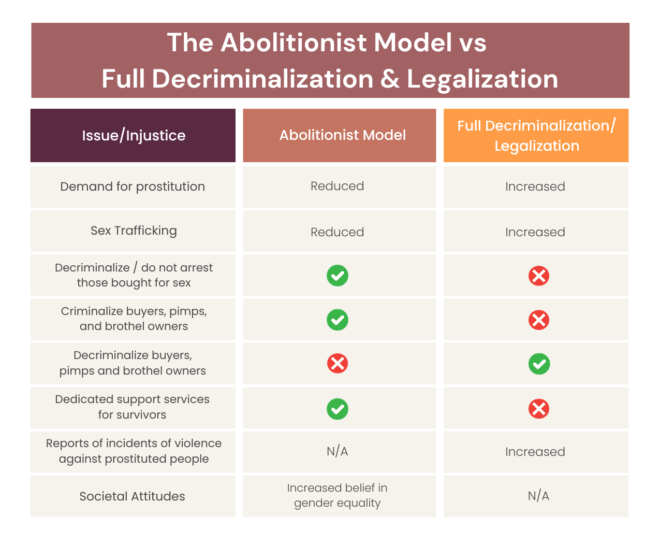
Exodus Cry is actively involved in the fight to pass the Abolitionist Model of law around the world, to make sex buying a felony level offense in order to uproot trafficking, and to offer prostituted individuals with essential social services. We’ve screened our documentaries for legislative bodies in multiple countries, met with lawmakers, and have already seen laws be changed because of it. You can be an important part of the movement to abolish sex trafficking by giving here.
Interested in learning more about prostitution? Click the links below:
Is “Sex Work” a Legitimate Job?
Watch our award-winning documentary, Nefarious: Merchant of Souls, featuring stories from prostitution survivors.
